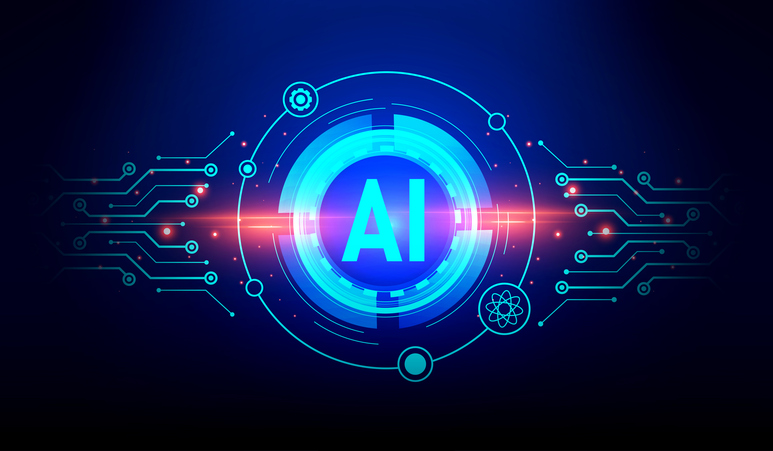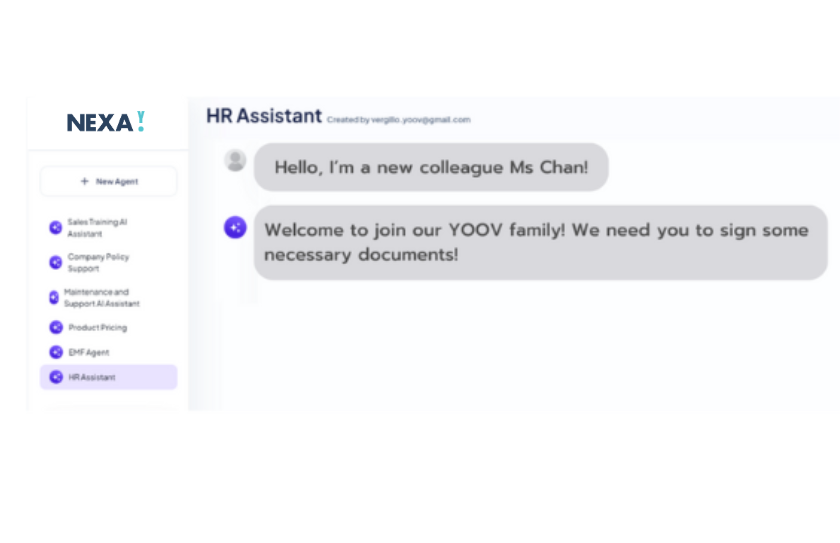Building a motivated and engaged staff requires effective employee onboarding. However, conventional onboarding procedures are frequently laborious, resource-intensive, and prone to human mistakes. Managing a high number of candidates is burdensome as firms expand. Ineffective onboarding results in lost time, decreased output, and increased employee turnover. Therefore, there’s need of an efficient HR system for business organizations.
Businesses want a solution that grows with them and improves employee engagement in light of the fiercer competition. Here comes artificial intelligence (AI), a recruiting and onboarding tool that is revolutionary.
Artificial intelligence (AI) is crucial for optimizing onboarding procedures because of its powers in automation, data analysis, and predictive modeling. Your human resources (HR) strategy may be enhanced by incorporating AI to provide a smooth, scalable, and effective onboarding process.
So, let’s now investigate how AI can enhance employee onboarding and completely transform your recruiting process.
How AI HR Systems Simplify The Candidate Screening Process?
Reducing Time-to-Hire
Traditional onboarding processes often involve reviewing resumes manually, which is both tedious and time-consuming. Hiring managers may sift through hundreds of resumes to identify qualified candidates; thus, extending the hiring timeline.
AI-powered recruitment tools, however, can automate the screening process, significantly reducing time-to-hire.
AI algorithms can scan resumes, identify top candidates, and highlight the most relevant skills. Hence, this accelerates candidate shortlisting, allowing HR teams to focus on engaging with potential hires. Moreover, AI can handle high volumes of applications, improving scalability and efficiency.

Improving Candidate Matching
One of the most significant advantages of AI in recruitment is its ability to match candidates to job roles more accurately. Using natural language processing (NLP) and machine learning, AI can assess resumes beyond just keywords. Efficient human resource management systems also evaluate candidate experience, skills, and qualifications holistically.
This results in more accurate candidate-job matches, reducing the likelihood of bad hires. AI-based tools can even predict cultural fit by analyzing a candidate’s behavior and communication patterns.
Humans are prone to making subjective decisions during the hiring process. AI eliminates these biases by relying solely on data and performance metrics. With AI’s objectivity, HR teams can make more informed hiring decisions, ensuring the best candidates are selected based on merit.
So, if you want to install the best human resource systems, visit YOOV.
Automating The Onboarding Workflow for New Hires
Streamlining Documentation & Compliance
Onboarding often involves managing an overwhelming amount of paperwork, including employment contracts, tax forms, and benefit enrollments. Manually handling these documents is not only time-consuming but also prone to errors. Hence, AI simplifies this process by automating document management.
HR teams can use AI-driven platforms to send, track, and store onboarding documents. These platforms ensure that all paperwork is completed on time, reducing compliance risks. Automation also ensures new employees have all the information they need on their first day.
As a result, it creates a smoother onboarding experience.
Personalized Onboarding Programs
An AI-based HR system can create personalized onboarding programs based on a new hire’s role, department, or skill set. Instead of using a one-size-fits-all approach, AI tailors the onboarding content to meet individual needs. For instance, AI can recommend specific training modules or team introductions, helping employees ramp up quickly.
These personalized programs can significantly enhance employee satisfaction, boosting long-term retention. Moreover, employees feel more valued and engaged when their onboarding experience is tailored to their needs.
Enhancing Employee Experience with AI
- Continuous Feedback
Feedback is essential to improving onboarding processes, but gathering and analyzing it manually can be cumbersome. AI-powered tools offer real-time feedback analytics by collecting data on employee engagement, learning progress, as well as onboarding experiences.
HR teams can use this data to identify bottlenecks in the onboarding process and improve employee experience. For example, if new hires struggle with certain training modules, AI analytics can highlight these issues for HR to address quickly.
- Intelligent Chatbots for 24/7 Support
New employees often have questions during the onboarding process, from understanding company policies to navigating benefit options. Thus, relying on HR teams to answer these queries may lead to delays. AI-powered chatbots can solve this problem by providing real-time, 24/7 support.

These chatbots are designed to answer common onboarding questions instantly, ensuring employees get timely information. AI-driven chatbots and human resources systems enhance employee experience by providing consistent, reliable support; hence, reducing frustration during onboarding.
- AI-Driven Diversity & Inclusion
Bias in recruitment is a common concern for many organizations. Traditional hiring practices can unintentionally favor certain candidates over others, leading to less diverse teams. Moreover, AI can help overcome these biases by anonymizing candidate information during the screening process.
AI-based recruitment tools focus on skills, qualifications, and experience, removing factors like gender, ethnicity, or age. Hence, it ensures a fairer, more inclusive hiring process, helping companies build diverse teams.
- Virtual Onboarding with AI-Powered Platforms
With remote work becoming more common, companies need efficient virtual onboarding processes. AI-powered platforms provide a seamless remote onboarding experience by automating key tasks.
These include sending digital forms, scheduling virtual introductions, and tracking new hire progress.
AI can also integrate with video conferencing tools and e-learning platforms to create a cohesive virtual onboarding experience. Consequently, remote employees feel more connected and informed, even when onboarding from a distance.
- Monitoring Remote Employee Engagement
Engaging remote employees during onboarding can be challenging. AI tools can monitor remote engagement levels by analyzing communication patterns, collaboration metrics, and feedback data. Thus, it assists HR teams ensure that remote employees are as engaged as their in-office counterparts.
Using AI to track these metrics in real time allows HR to take proactive steps to enhance remote employee engagement. Ultimately, such HR systems improve overall productivity and satisfaction.
Reducing Turnover with Predictive AI Models
Predicting Employee Success And Retention
One of the primary goals of onboarding is to ensure long-term employee retention. However, identifying potential turnover risks early is challenging. Additionally, AI-powered predictive models can analyze employee data, identifying patterns that may indicate turnover risks.
By analyzing historical employee data, performance metrics, and engagement levels, AI can predict which employees are most likely to succeed or leave within their first year. Moreover, human resource teams can use this information to intervene and provide additional support to at-risk employees.
Personalized Career Pathing
AI tools can also help create personalized career development plans for new employees. Therefore, by analyzing an employee’s skills, experiences, and career goals, AI can recommend development opportunities and learning resources that align with their aspirations.
This not only enhances job satisfaction but also encourages long-term commitment. Henceforth, employees who see a clear path for growth within the organization are less likely to seek opportunities elsewhere.
Integrating AI with Other HR Technologies
- AI systems are constantly learning and improving. As more data is collected during onboarding, AI becomes better at identifying trends and optimizing processes. Over time, AI will continue to evolve, offering more sophisticated solutions for onboarding, such as enhanced gamified learning modules or AI-driven mentoring programs.
- AI can easily integrate with other HR technologies like applicant tracking systems (ATS) and human resource information systems (HRIS). Hence, this integration provides HR teams with a centralized platform to manage recruitment, onboarding, and employee engagement seamlessly.
In the future, AI will likely become an integral part of a fully automated HR ecosystem, driving efficiency across all stages of the employee lifecycle.
End Note
As the business landscape becomes more competitive, companies need efficient and scalable onboarding solutions. AI not only streamlines the recruitment process but also enhances employee engagement and retention. Therefore, by integrating AI in HR systems for onboarding process, you can create a more efficient process. It could be a personalized, and data-driven experience for new hires. Hence, reach YOOV in this regard.
Incorporating AI in onboarding isn’t just about saving time; it’s about building a foundation for long-term success. Embrace AI today to revolutionize your recruitment and onboarding processes, staying ahead in the talent race.
Connect with YOOV

Tel:+852 2988 8883
WhatsApp:Click Here
Email:cs@yoov.com
Website:https://www.yoov.com/